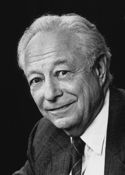The question matters because many smart libertarians and conservatives, Bryan Caplan included, are wondering whether the two groups can overcome their differences, either for short-term coalitions on particular issues and elections or to create a longer-term movement.
My view is that the philosophical differences between the two militate against long-term compatibility, though there are prospects for targeted short-term alliances. Here are two relevant pieces of data: quotations from two major conservatives, each representative of a different sub-species of conservatism.
 First the traditional conservatives, taking Robert Bork as representative, this from his Slouching Towards Gomorrah:
First the traditional conservatives, taking Robert Bork as representative, this from his Slouching Towards Gomorrah:
“Because both libertarians and modern liberals are oblivious to social reality, both demand radical personal autonomy in expression. That is one reason libertarians are not to be confused, as they often are, with conservatives” (p. 150). Bork goes on to argue that “Free market economists are particularly vulnerable to the libertarian virus” and to cite philosophical errors about ethics and human nature as the root problem: too often the free market economist “ignores the question of which wants it is moral to satisfy” (p. 151) and fails to recognize that “[u]nconstrained human nature will seek degeneracy often enough to create a disorderly, hedonistic, and dangerous society” (p. 153).
 Second, the neo-conservatives, taking Irving Kristol, “godfather” of the neo-cons, as representative, this from his contribution to his co-edited Capitalism Today:
Second, the neo-conservatives, taking Irving Kristol, “godfather” of the neo-cons, as representative, this from his contribution to his co-edited Capitalism Today:
“The inner spiritual chaos of the times, so powerfully created by the dynamics of capitalism itself, is such as to make nihilism an easy temptation. A ‘free society’ in Hayek’s sense gives birth in massive numbers to ‘free spirits’ – emptied of moral substance” (p. 13).
Bork and Kristol are hostile to free-market capitalism, and both are major representatives of conservatism. Both recognize that free-market capitalism is generally economically fruitful, but they have major philosophical objections to it. So some follow up questions:
1. In contemporary conservatism, what proportions of its members are traditional, neo-con, or other?
2. Are Robert Bork’s and Irving Kristol’s views still representative of current traditional and neo-con thinking?
3. While economic liberty is extremely important to libertarians, how strong is the mainstream conservative commitment to economic liberty?
4. While libertarians advocate for liberty consistently in all human affairs, do conservatives see economic liberty as compatible with liberty in other areas of human life: religion, sex, family, art, foreign affairs, and so on?
5. To the extent that conservatives believe economic liberty to be in conflict with other important human values, how likely are they to sacrifice economic liberty?
We need good survey data on those questions to be able to answer this follow-up question:
6. To the extent that there are philosophical differences between libertarians and conservatives, can or should those differences be set aside to pursue short-term coalitions?
[For more on neo-conservatism, I recommend Brad Thompson’s study.]
[Thanks to Dan for the Kristol image correction.]
1. Just to point out, without discounting the obvious benefits of an empirical study: There is a potential shortcoming to estimating the values espoused by the median adherents of a group/movement based on what leading advocates of a movement write in their polemical works. Obviously these writers are trying to emphasize what their specific differences with libertarianism are in these essays/books. That’s the point of writing the books in the first place – to redirect the agenda. So of course those differences are going to be exaggerated when taken from that perspective. I doubt that the average conservative sees those differences as obvious or true (hence the need for the essay and its novelty) and I even doubt that Kristol or Bork feel/felt them as much on a regular basis.
2. Also, the claim that morality isn’t silent beyond the threshold of freedom is hardly an anti-freedom claim. Sure, Bork and Kristol may think that freedom needs to be reevaluated on these lines, but the appeal of their arguments will be broader. Criticism of the libertarian movement for espousing a shallow and big-tent form of what is essentially mere libertinism is fairly common. But it doesn’t imply any hostility to libertarianism as a political philosophy or to the importance of liberty as a moral principle.
Criticism of the libertarian movement for espousing a shallow and big-tent form of what is essentially mere libertinism is fairly common. But it doesn’t imply any hostility to libertarianism as a political philosophy or to the importance of liberty as a moral principle.
This is not true. The argument that libertarianism leads to moral degeneracy is a CORE conservative argument amongst conservative INTELLECTUALS. That rank and file conservatives may be a mix of classical liberal/libertarian and conservative ideas does not change the reality of what Conservatism is.
But I think the deeper problem is that conservative intellectuals are in one sense right about libertarianism. It has no moral foundation and it is so often mired in subjectivism and moral relativism, not to mention its association with anarchism. And that is because classical liberalism / libertarianism is loaded with bad philosophical premises that only Ayn Rand’s philosophy can correct. Libertarianism without Rand is doomed.
Professor Hicks should know this or at least I hope he knows it. Rand’s epistemology and ethics is the answer to both the anarcho-libertarians and the conservatives. Rand has rescued Classical Liberalism and given it a firm foundation.
To save America (if that can be done) or to build a free society in the future all depends on the cultural ascendancy of Rand and what her philosophy will lead to. Its a simple as that.
This is a piece that I wrote on this topic a few years ago when the Fall of the Wall precipitated a problem for conservatives and libertarians who had been united in their resistance to the “Evil Empire”.
http://www.the-rathouse.com/hayuniting.html
The idea is that conservatives need to learn more economics and the economists need to be more sensitive to the “cultural agenda”.